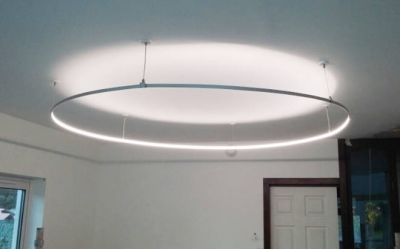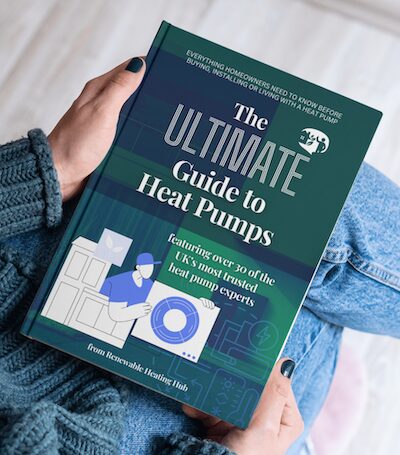Bivalent oil boiler system to work alongside ground or water source heat pump
Hello, I didn't know where best to post this, as it covers about every one of the subgroups, so here's hoping (and apologies if I've missed the general section!).
I am looking for some help, on a specific question but then more generally a sense-check in terms of the things to consider for ideally reducing bills in a house we plan to live in for the next 20-40 years.
The specific question – is it possible to have an oil boiler system running alongside a water source (or air, or ground) heat pump?
"why would you do that?" is a reasonable question - the reason being that we've had our oil fired boiler die after 7 years (just out of warranty). I have a young family who are getting bored of the oil radiators around the house, and I suspect my desire to fully explore renewables is going to meet the wall of my wife wanting a warm house. I know the days are getting warmer, so I might have a little more time than she thinks. However, I imagine that the lead times for renewable installs is probably going to be an issue, so we need to spend £5-10k in the next few weeks to tide us over.
It is frustrating as I’d planned to fully explore the topic of renewable sources for our house this summer, figuring that leaving it a while after the storms would mean demand had dropped off… Lesson learned.
There is a less significant point about retaining an oil boiler for the house in that we also use an oil boiler elsewhere, fed by the same tank, to warm a small office I use a day or two a week.
So, I think I'm in the position of needing to replace an oil boiler today, but wanting to supplement and ideally essentially replace its use in the house within the next few months with a mix of renewable sources. My ignorant question is, is it possible to have a WSHP (we have access to a nearby large body of water for this) or A/GSHP, supplemented by oil? In my mind, I could see that if it worked, this could be ideal, with oil taking the edge off colder days.
For background, we live in a c16th century house, which is (relatively) well-insulated (to the extent it's advisable) and double-glazed. The sleeping part of the house is old and cold but was renovated 20 years ago and is cold mainly because the radiators are small, and the downstairs living bit is half an extension with UFH.
In terms of use, we use c6000 litres of oil a year, and terrifyingly about 35-40,000 kW. I know it's a lot. While it doesn't explain it all, we have lots of halogen lights, an electric aga that my wife turns off for c3 weeks a year, and a pool run with ASHP for 3 months a year.
Aside from the short term conundrum, I am looking at all options, and the order of attack for me is (I think), as follows:
- replace boiler (because I have to, but I might get away with it until summer if the weather stays ok)
- replace the 85 halogen MR16 downlighter in the house with LED (any recommendations for a wife who thinks LED is too blue / harsh?). I have already replaced a load of strip lights and every GU10 I can find.
- fully investigate installing GSHP or WSHP. We have water about 80m from the house, and 50 of the 80m is a field that we could also use for GSHP. It would be amazing to use the pond for this, or we could use the field, but I understand that water is a better medium for this.
- To power at least a bit of this, and reduce our electricity consumption somewhat, install a solar array in the same field. We are fortunate to have space facing south, in an unshaded spot, for about 100m2 of panels, if not more. My simplistic view is that we use so much power that we should go as big as we can on this.
- Battery - I'm not sure we need one as I think we'll use the energy we generate year round. I haven't got the maths to work on this, but after being without power for 3 days post the recent storms I am less about price and more interested in a solution that keeps the oil boiler working!
- Other thoughts include:
- Pellet boiler – friends rave about them, but I’m not sure I can make this work. We have the space for a boiler and a 5-6 tonne store, but across the drive and it feels like a big faff to then be reliant on outside suppliers.
- Combi pellet / wood – we don’t have the wood for this
- Solar thermal for the house – this could work or at least reduce our use of oil in summer (but perhaps overkill if the solar panels are diverting supply into the immersion heater)
- Solar thermal for our swimming pool – this seems extravagant / stupid for 3 months of use, but also quite satisfying!
Apologies for the ramble, but there’s a lot to consider and I’ve yet to find a really good generalist, rather than an e.g. solar expert, or a pellet expert!
If anyone has anyone they rate, I’d welcome an introduction. We are based in North Hampshire, near Hook.
I welcome any and all criticism and suggestions - I reckon that I know just enough to be really dangerous!
@ldnajt, welcome to the forums. Going bivalent is, to my mind, a sensible strategy, especially if you can run your oil boiler on a biofuel like HVO. We actually run our air source heat pump with our oiler boiler as a bivalent system and you can watch this video if you have the time to see how it's performing.
I'll address the water and ground source. Water source, to my understanding, is much cheaper to install (as you don't have to drill holes or dig trenches). The coils simply get placed in the water and the piping is run to the heat pump unit in the house. The most important thing about water source is that the water is 'moving'. It needs to flow out and be replaced with "new" water that brings its own heat. If that doesn't happen at an acceptable rate, the body of water will freeze over. Water source, to my knowledge, is more efficient that ground source, provided there's moving water. This is one of the main reasons we weren't able to use our pond.
So the quick and easy answer is that yes, you can get your oil boiler to work as a bivalent/hybrid system with a ground or water source heat pump. It's a matter of finding a suitable installer to get the job done properly. In terms of installers, I'd start by taking a look at the GSHPA website. In terms of heat pump units, Kensa are a market leader.
I would stay away from pellet boilers – everyone I've spoken to says they're a nightmare to maintain.
Solar thermal – definitely go with that if you have the budget. It's a quick and easy win. You should also consider solar PV.
Glad you replaced the halogens. We did the same at our house. It cost us over £200 in warm LED bulbs, but that paid itself back quite quickly, which will be even quicker with the current electricity tariffs.
Batteries are an interesting one. We're looking into it now for the first time, but there are others here that will provide far more insight into their benefits.
Get a copy of The Ultimate Guide to Heat Pumps
Subscribe and follow our YouTube channel!
Posted by: @ldnajtreplace the 85 halogen MR16 downlighter in the house with LED (any recommendations for a wife who thinks LED is too blue / harsh?).
LEDs come in a range of colour temperatures. Some of the warm ones are really quite yellow.
On other things, I think you can have a boiler alongside a heat pump but it will be without any grant funding... there are posts on here about the difference between a grid import/export battery and an Uninterruptable Power Supply so it may not be as simple as you expect to keep the boiler running unless it has two power inputs... home pellet boilers I have met smell funny but may have been misconfigured... and I do not agree it need be a choice between renewable heating and a warm house, but it may depend on the house if renewable heat is affordable.
Hi @ldnajt
I'm curious to know what you ended up doing? It sounds as though we have a similar setup to you, and I'm looking at bivalent systems, it would be great to hear if you had any feedback or advice on what you decided to implement.
Thanks
Olly
Posted by: @ldnajtreplace the 85 halogen MR16 downlighter in the house with LED (any recommendations for a wife who thinks LED is too blue / harsh?). I have already replaced a load of strip lights and every GU10 I can find.
I can provide a lot of detail on LED lighting.
But no one else would find it hidden away on this topic!
I use some LED-bulbs, and also create my own LED lights using component parts.
They achieve greater efficiency and longer life.
Please raise this issue in a separate topic and tag me there (insert my forum ID with the @ symbol at the start).
I'll then receive an email to alert me that I've been mentioned.
Save energy... recycle electrons!
- 26 Forums
- 2,396 Topics
- 54.3 K Posts
- 266 Online
- 6,077 Members
Join Us!
Worth Watching
Latest Posts
-

RE: Setback savings - fact or fiction?
No need to create a new thread, @sheriff-fatman. You do...
By Majordennisbloodnok , 2 hours ago
-

RE: Power outages and storms: A surprisingly good DNO experience
Well done to Scottish Power for doing a good job. Well ...
By Majordennisbloodnok , 3 hours ago
-
RE: Advice for a novice on Mitsubishi Ecodan 6kW
Fair point. The highest frequency of defrosts I'd seen...
By Sheriff Fatman , 4 hours ago
-

RE: Heatpunk Floor plan issues
It's usually the complete opposite... seldom that Safar...
By Mars , 4 hours ago
-
RE: RDSAP10 effect on existing heat pump EPC rating?
@mike-patrick interesting update - thanks.I've been thr...
By Tim441 , 5 hours ago
-
RE: Recommended home battery inverters + regulatory matters - help requested
I remember reading in some inverters. They mandate a se...
By Batpred , 5 hours ago
-

RE: Fan is clipping ice build up from the front of unit.
@majordennisbloodnok I’ll not go there thanks! Toodles.
By Toodles , 7 hours ago
-

RE: Running from backup generaor in powercut?
@majordennisbloodnok Back in the 80’ or 90’ we had a te...
By Toodles , 7 hours ago
-
RE: Running my new Nibe ASHP efficiently
I'm new to the forum. Did you get a reply to this last ...
By Mike @ Camelot , 8 hours ago
-

RE: ASHP Energy Consumption: Aira 12kW heat pump
@grantmethestrength MCS requirements for DHW capacity h...
By Toodles , 9 hours ago
-
RE: New Mitsubishi Ecodan 11.2kW installation - L9 errors and maybe more
Great to hear! I just figured this out a day or tw...
By anotherdaveuk , 10 hours ago
-
RE: Help me keep the faith with my air source heat pump installation
@adamk I'm observing my own system at low temperatures ...
By dr_dongle , 15 hours ago
-

RE: Free Ecoheat Heat Pump Install
@deltona Yes older houses are problematic like that, bu...
By bontwoody , 1 day ago
-
RE: Radiator sizing sanity check
As I mentioned early on the cost of supplying and fitti...
By JamesPa , 2 days ago
-
RE: Electricity price predictions
Great point, one of the key ones in my chat with Octopu...
By Batpred , 2 days ago
-

RE: New Fogstar 15.5kWh upright solution
Let me point out that there are many Chinese suppliers ...
By Transparent , 2 days ago
-

RE: Weather compensation- why you should use it
@majordennisbloodnok — The Two Ronnies Mastermind sketc...
By cathodeRay , 2 days ago
-
Just realised that this image of the cylinder cupboard ...
By Sheriff Fatman , 2 days ago
-

RE: Rodents! A word of warning for heat pump owners
Two thoughts: 1: Let's ask @david-s if Primary Pro in...
By Transparent , 2 days ago
-
RE: Solis S6-EH1P8K-L-PLUS – Why I Chose It and What I’ve Learned So Far
In the diagram below, I describe my understanding of th...
By Batpred , 2 days ago






